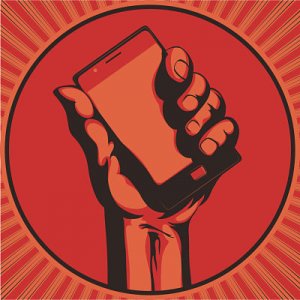|
|
 The truth is, we live in a permanent technological revolution. Remember when you didn’t have a cell phone because no one did. Granted some of you may be too young to remember that – but the majority of readers are not. That’s a pretty short window. We’ve gone from not knowing what a mobile phone was to 91% of adults have a mobile device within arm’s reach 24/7 in less than 25 years.
The truth is, we live in a permanent technological revolution. Remember when you didn’t have a cell phone because no one did. Granted some of you may be too young to remember that – but the majority of readers are not. That’s a pretty short window. We’ve gone from not knowing what a mobile phone was to 91% of adults have a mobile device within arm’s reach 24/7 in less than 25 years.
And if anything, things are just moving faster than ever, which means we’d better buckle in because we’re on a never-ending roller coaster.
Consider these additional facts:
- 95% of all text messages are read and read within 90 seconds of receipt
- 65% of all email is opened on a mobile device versus a desktop or laptop
- Mobile is now the first screen worldwide – eclipsing screen time on both PCs and TVs
- There are more mobile devices on the planet than there are people
Mobile has become THE place for media consumption. It’s where people connect on social media, it’s where they watch videos, read, search for where they should eat dinner and, based on their apps – renew their prescriptions, pay for coffee with a quick scan or board a plane. And that’s child’s play compared to what is coming next.
But the important thing for us to recognize from a marketing point of view has nothing to do with the devices. The real mobile revolution is about our behaviors and choices, not the device of the day.
This technology has changed how consumers behave. They are less patient, more demanding, have higher expectations and a lower tolerance for any sort of delay, disappointment or lack of options.
Forget millennials or baby boomers. We’ve become the IWWIWWIWI culture.
The “I want what I want when I want it” attitude is evident in how we consume today. Wait for a TV show to actually be on TV? Forget it. I’ll watch what I want, when I want and I will binge watch as many episodes as I want on whichever device I want. Wait a week for you to get something in stock? I don’t think so. I’ll just order it on Amazon and I’ll have it tomorrow.
A global survey asked respondents to assign a value to their smart phone and the average consumer came up with an implied value of $6,000. Which makes perfect sense, given how we’ve come to rely on the super computers we carry in our pockets every day.
Those are the consumers we’re trying to reach and sell to every day. How should we be taking advantage of this mobile revolution to win the loyalty and buying dollars of these consumers?
As marketers we can and should be using mobile to:
- Deliver time sensitive content to audiences
- Reach out to audiences with location specific information and offers
- Solve problems for key audiences at the exact moment/location they need it
- Create community around a passion or cause or shared need/experience
- Develop a deeper, more meaningful experience or connection
- Accomplish tasks in a faster, easier and better way
One of the realities of this new world is that what used to be unattainable for the average small to mid-sized business is now well within your reach, both in terms of access to the technology and affordability.
Over the next couple of weeks, we’ll look at some of the ways mobile is being used today to connect with consumers, build brands, and drive sales. We’ll look at B2B and B2C examples that are leveraging everything from SMS texts, QR Codes, augmented reality, mobile apps, location/GPS technologies and much more.
